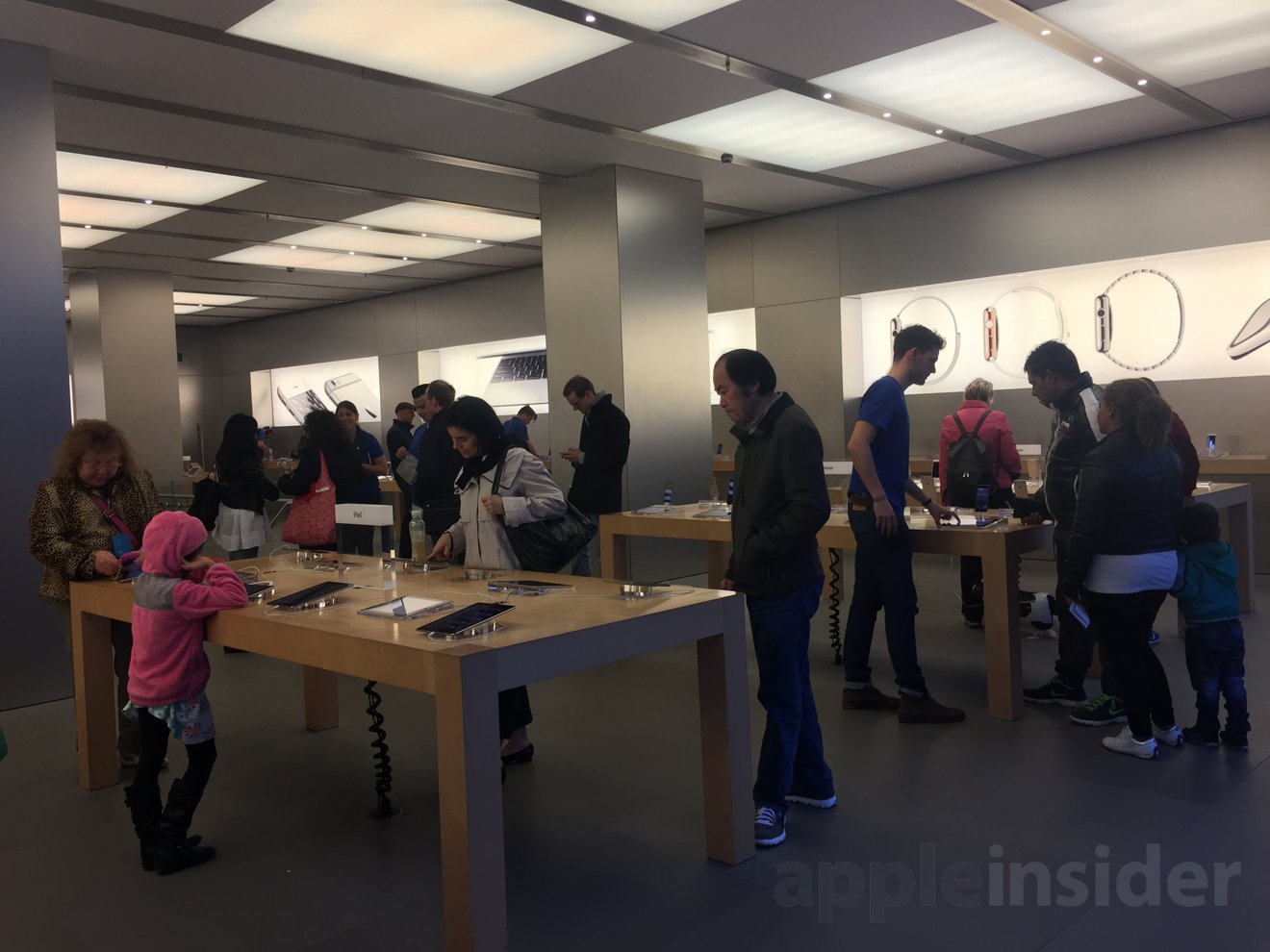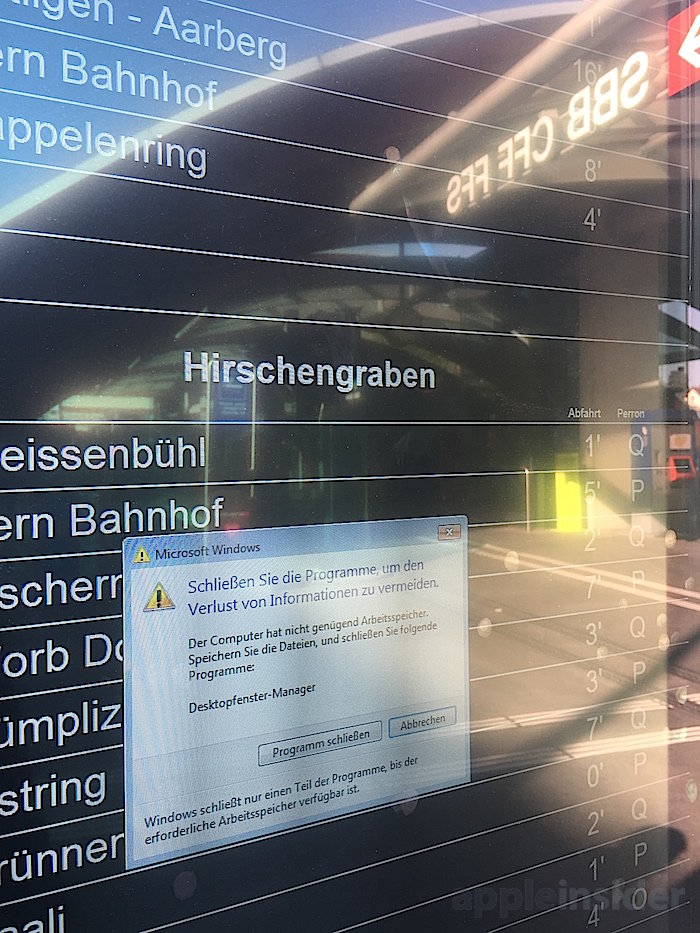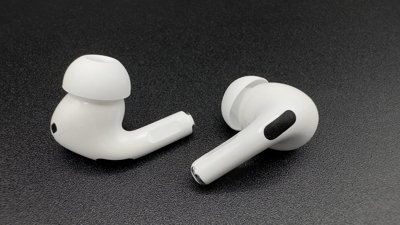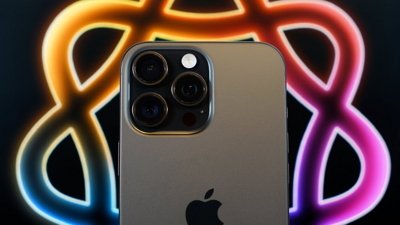Switzerland is an affluent country with lots of people who value high quality products and new technology, making it a potential hotspot for Apple Watch— at least once the new product is officially launched in the country, known for its breathtaking mountains and equally breathtaking consumer prices.
No Apple Watch for Switzerland, yet
Apple hasn't yet launched its new Watch in Switzerland, where the company operates four retail stores: two in greater Zürich, one in Basel and one in Geneva. Despite not being among Apple's initial launch countries for Apple Watch, the company's Swiss retail stores are already featuring wall graphics depicting the product, as seen below in the Zürich store located in the city's upscale Bahnhofstrasse shopping district.
The country has a population of just over 8.1 million people, making its four Apple Stores among the most densely packed for a foreign country. By way of comparison, Apple has no stores in Taiwan, a nation of over 23 million people; just one Shenzhen store serving the 105 million people in China's Guangdong Province and just three in Hong Kong, which has a population of nearly 7.2 million.
However, Hong Kong hosts many millions of tourist shoppers from mainland China and surrounding countries, while the high prices in Switzerland make the country a poor option for shoppers visiting from the surrounding countries of Europe.
Swiss cross-border shopping tends to flow in the opposite direction, with Swiss residents leaving to shop in France, Germany or Italy. That indicates that Apple sees a strong demand for its products from the Swiss themselves in Switzerland, and that demand is likely to also apply to Apple Watch, once it is launched in the country. The Zürich Apple Store I visited was busy with customers perusing iPads, iPhones and Macs, despite prices significantly higher than the U.S.
My Swiss friends (or as they say, "Suisse") tended to carry iPhones and it's common to own Apple TV, iPads and Macs. That's a major change from my first visit to Switzerland back in 1999, when Macs were rather rare anywhere in Europe. Every time I've visited since, spottings of Apple products have grown more frequent and are increasingly accompanied by prominent ads for mobile apps, carrier ads for Apple's mobile devices and specialty shops handling Macs and iOS products.
The Swiss are accustomed to paying higher prices for virtually everything, but wages in the country are also relatively high. That contributes to a high quality of life, where an affluent population is comfortable with spending more to buy higher quality goods. Apartments tend to offer premium appliances and fixtures, and residents tend to drive higher end cars, making Apple's luxury-class electronics naturally more attractive than the bargain, no-name, fix-it-yourself type commodity PCs and Android devices that are more common in less affluent countries.
That's certainly not to say that Windows no longer exists in the country: at the train station in Berne, it was clear that the arrival information signs were using Microsoft software because their information was obscured by a dialog box imploring the public to save and close the desktop window manager to avoid the loss of data because the system had run out of memory. Unfortunately, the screens were only displays, leaving the public helpless to speichern or schließen anything.
To its credit, the SBB rail system has also developed iOS apps that handle ticketing and provide information on arrivals, making the PC-based station signage less critical for riders to depend upon.
The popularity of existing Apple products within Switzerland should contribute toward Apple Watch eventually making a splash in the country— even though it is already awash in watches. Nearly 60,000 people are employed by the Swiss watch industry, and the horological industry is worth over $20 billion annually to the Swiss economy. However, much of that business is targeted at exports aimed at luxury buyers in other countries— including major markets in the U.S. and China, where Apple Watch has already launched.
The delayed launch of Apple Watch in Switzerland itself, ostensibly related to a trademark issue, is supposedly going to continue until the end of 2015. Apple hasn't yet detailed when it will open up Watch sales in other countries. However, supplies are currently so constrained that even buyers in the U.S. and other launch countries are cited minimum wait times of two to four weeks for online orders, with some models not being listed as available to ship before July.
However, any Swiss who want to buy an Apple Watch can wait in line at one of the few and far between boutique shops currently stocking the product, including Colette in Paris, Dover Street Market in London, The Corner in Berlin, and— for long distance travel shoppers— Maxfield in Los Angeles or Dover Street Market in Tokyo.
Apple Pay worked for me in Switzerland
Apple also hasn't yet expanded Apple Pay outside the U.S. either. That didn't stop me from successfully making a groceries purchase (at Jelmoli Warenhaus) via NFC using my iPhone 6 Plus in Zürich on my trip over the last three weeks, however.
NFC terminals are relatively common in the country, which is known for its banking and early adoption of technology. Apple Pay wasn't accepted everywhere I tried to use it, but it did work in a retail store with my phone configured to use an American Citibank account. Had I been using an Apple Watch configured with the same account, it most certainly would have worked as well.
An earlier attempt to use Apple Pay at a Swiss train station ticketing kiosk appeared to work initially but was then declined. However, that machine also refused to accept my U.S. credit card. Citibank hasn't yet introduced the mobile SIM-like "chip-and-pin" cards that Europe has been using for decades; they told me before my trip that they'd start issuing new cards later this summer.
This indicates that Apple Pay may roll out globally much faster than anticipated, as the primary issue holding back a broader launch is simply the agreements with banking partners. The core NFC technology Apple selected for its payment system is already broadly implemented, and its already being used in a variety of countries with tap-to-pay cards. Integrating the same ease of payment into iOS products should be quite simple to introduce to the Swiss.
In contrast, the magnetic card swipe emulation technology that Samsung acquired to bolster its own payment system is unlikely to work in many European style card readers, and will certainly not function in places like the Swiss train station where America's archaic swipe cards aren't even recognized (but where NFC elements are available).
Prior to my visit to Switzerland (where I captured the above 240fps Slomo on an iPhone 6 Plus), I visited London to observe the Apple Watch launch in that country. A subsequent article will detail my experiences in Apple's own retail stores, as well as the store within a store at Selfridges.
 Daniel Eran Dilger
Daniel Eran Dilger





-xl-(1)-xl-xl-m.jpg)





-m.jpg)






 Chip Loder
Chip Loder
 Amber Neely
Amber Neely
 Wesley Hilliard
Wesley Hilliard
 Marko Zivkovic
Marko Zivkovic
 Andrew Orr
Andrew Orr
 Malcolm Owen
Malcolm Owen








57 Comments
It just boggles my mind at how far behind the USA has allowed itself to get, considering that so many other industrialized countries in the world adopted chip & PIN tech DECADES ago!
Up here in Canada, we've had C&P for, I think, more than a decade now, and whilst the cards are no where near as secure as they should be (hence why I carry them in a RFID-shielded wallet), it's still vastly better than the decades-old mag stripe system still in use by the USA.
On a recent trip to Denver, CO by a friend of mine, they made a purchase (the first purchase of the trip) at the bar of the Hilton they stayed at. Guess what? Card got compromised on its first use there by a jacked card reader terminal! ?PAY can't roll out soon enough, even for countries fooled by the supposed security of C&P tech.
One example uncovered by the BBC in the UK, which demonstrates flaws in C&P:
https://www.youtube.com/watch?v=_yyfcHSXZLc
There's also this beautiful report on how RFID-equiped CC's in the USA are transmitting their data thru the air with NO ENCRYPTION:
https://www.youtube.com/watch?v=lLAFhTjsQHw
Banks claim these technologies are secure, YEAH RIGHT! Apple, roll out ?PAY as fast as you can!!!
No contrast whatsoever. Samsung Pay also uses NFC, so an S6 would be able to make an NFC contactless payment. The ability to use magstripe terminals is in addition to NFC capability.
It just boggles my mind at how far behind the USA has allowed itself to get, considering that so many other industrialized countries in the world adopted chip & PIN tech DECADES ago!
Up here in Canada, we've had C&P for, I think, more than a decade now, and whilst the cards are no where near as secure as they should be (hence why I carry them in a RFID-shielded wallet), it's still vastly better than the decades-old mag stripe system still in use by the USA.
On a recent trip to Denver, CO by a friend of mine, they made a purchase (the first purchase of the trip) at the bar of the Hilton they stayed at. Guess what? Card got compromised on its first use there by a jacked card reader terminal! ?PAY can't roll out soon enough, even for countries fooled by the supposed security of C&P tech.
One example uncovered by the BBC in the UK, which demonstrates flaws in C&P:
https://www.youtube.com/watch?v=_yyfcHSXZLc
There's also this beautiful report on how RFID-equiped CC's in the USA are transmitting their data thru the air with NO ENCRYPTION:
https://www.youtube.com/watch?v=lLAFhTjsQHw
Banks claim these technologies are secure, YEAH RIGHT! Apple, roll out ?PAY as fast as you can!!!
The incidence of Chip and Pin fraud appears to be utterly negligible and required flaws in terminal hardware together with considerable technical sophistication. Trying to argue Chip and Pin is insecure is nothing less than FUD. The terminal manufacturers and other related parties appear to have addressed the issues that allowed the two or three instances of C&P security breach that have been reported.
The incidence of Chip and Pin fraud appears to be utterly negligible and required flaws in terminal hardware together with considerable technical sophistication. Trying to argue Chip and Pin is insecure is nothing less than FUD. The terminal manufacturers and other related parties appear to have addressed the issues that allowed the two or three instances of C&P security breach that have been reported.
WOW, just WOW... Most ignorant comment I've read in AGES here!!!
Get your head out of the sand, PLEASE!!!
I see you're from Ireland, so perhaps things are different there, but trust me, C&P / RFID fraud occurs far more often than you seem to think in North America.
[quote name="cnocbui" url="/t/186192/inside-apple-inc-in-switzerland-no-watch-yet-but-apple-pay-unofficially-working-strong-demand-for-products/0_100#post_2721718"] No contrast whatsoever. Samsung Pay also uses NFC, so an S6 would be able to make an NFC contactless payment. The ability to use magstripe terminals is in addition to NFC capability. [/quote] Exactly! There is no contrast at all as you'd be able to use any NFC terminal just the same.